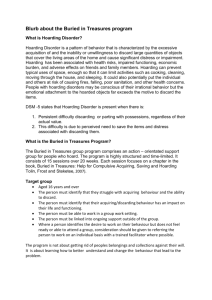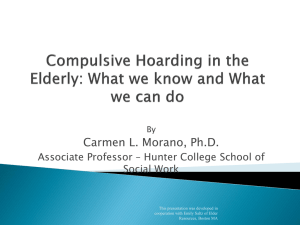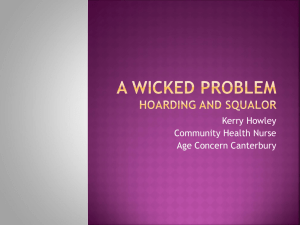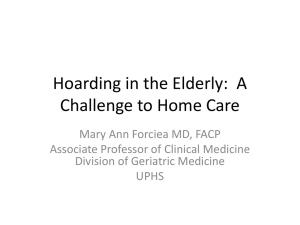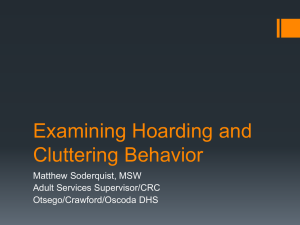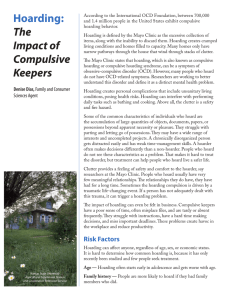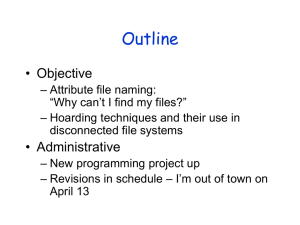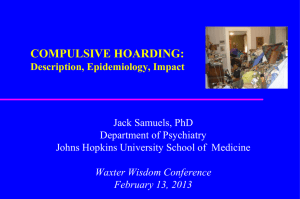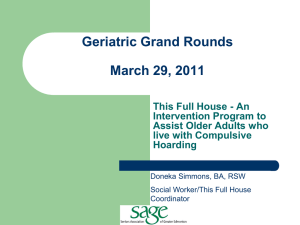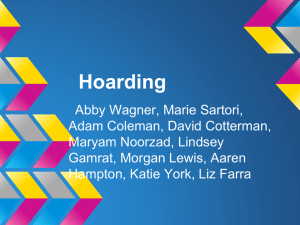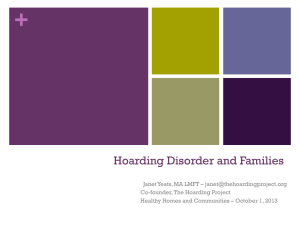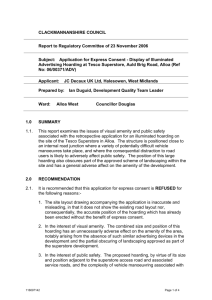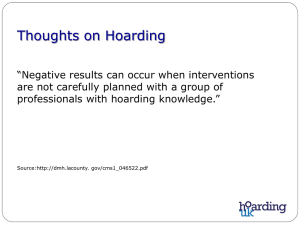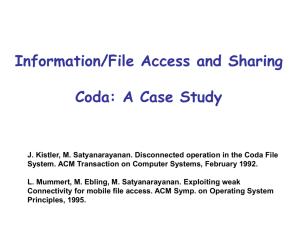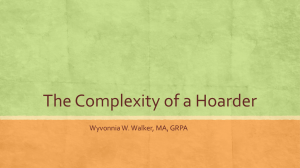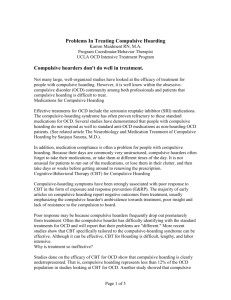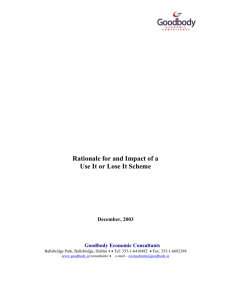PowerPoint - Hoarding - CCI
advertisement
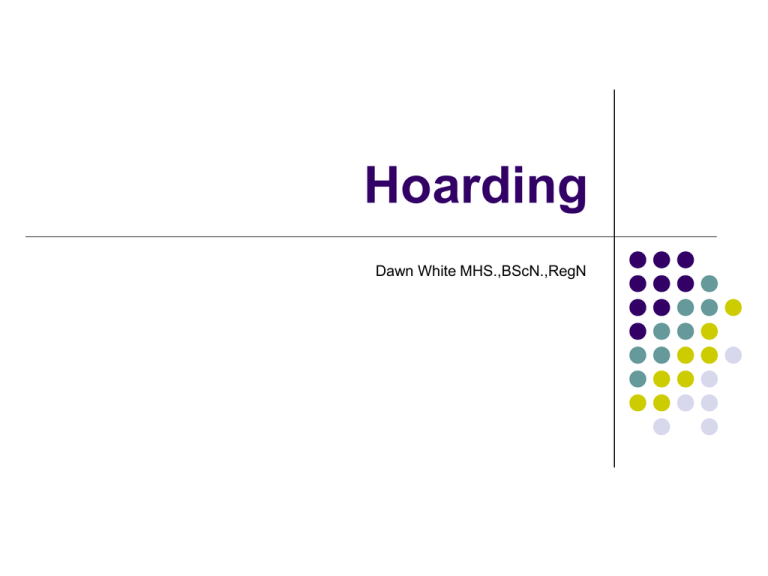
Hoarding Dawn White MHS.,BScN.,RegN Did You Know Hoarding is not limited to social class, race, culture or education level Interventions are normally costly, complex and time consuming Without proper intervention, the hoarders environment will continue to evolve until the safety of the individual and the community might be put at risk What is Hoarding? Excessive accumulation and failure to discard proportionately (animals or things) Activities of daily living are impaired by spaces which cannot be used for intended purposes Distress or impairment in functioning to the person hoarding or others such as neighbours/family/fire department/landlord/condo corporations Is Hoarding Cluttering? No In cluttering the volume is less Clutterers are still able to discard things, albeit it may take effort on their part The clutter does not debilitate their lives to the same degree as those who hoard Cluttering MAY be a stage in developing hoarding Prevalence 1-5% of General Population USA based stats. No stats yet for Canada Increases as person ages OCD may be part of it, but is not evident in majority of those who hoard In London, those who hoard could range from 3,500 to 17,500 people in the city If you had a complex of 64 units, with an average of 2 ppl per unit = 1-6 hoarders Why Do People Hoard? No conclusive answer yet but as of 2013 it will become an official psychiatric diagnosis It legitimizes it as an illness and not simply slovenly or lazy behaviour New brain imaging research (Tolin, 2012) has revealed that hoarders, when faced with being asked to pick and discard even junk mail feel intense discomfort and anxiety Their brain does not activate the area that allows us to decide what is important and what is not so everything can feel important Why do People Hoard? (cont) Hoarders also took much longer to decide what to discard. Parts of the brain responsible for motivation and insight also under-performed, which might account for why hoarders are able to live with such extreme living conditions. They notice it, but feel no motivation to clean it up nor do they seem to recognize what a problem it is. This is also seen in people with autism. Why Do People Hoard (cont) Another part of their brain was over-stimulated; the part which causes attachment to personal objects and the ability to make decisions about their possessions that others would consider reasonable This causes the anxiety, irritability, tearfulness, feelings of being overwhelmed, grief and sadness that is the hallmark of what someone who hoards experiences at the thought of throwing any of their possessions away Why Do People Hoard Genetics: May be a genetic link 84% have a close family member with hoarding behaviour 37% have a history of OCD No conclusive proof, but it does seem to run in families Learned behaviour would also play a major role as well Why is this an important subject? For the person who hoards and their families: It can create impaired activities of daily living/unhealthy living conditions/unsafe living conditions For property managers, condo corporations/general public who live in close proximity: It can be a legal, public health and safety issue. Examples may be vermin, fire load, structural collapse and lack of ability for Emergency Responders to access the individual Often people who hoard will not voluntarily get help. It is often found by accident Hoarding Types Common hoarding Subcategories of generalist vs specialist Diogenes Syndrome Animal hoarding Common Hoarding Anything can be hoarded Generalists save everything. Very valuable items may be mixed in with garbage Specialists save only specific items, ie dolls or tools. Characteristics Belief that emotional comfort comes from objects Objects may be connected to important people in their lives; therefore the object BECOMES the person Having these objects is almost like having the person still a presence in their lives This is why it may be so hard to discard objects. It is as if they are discarding their loved one Characteristics Fear of losing something important “I might need that!” Feeling of loss of self or identity Need for control of possessions Due to distress of throwing away possessions; it is avoided at all costs Characteristics and Beliefs Just in case—I might need it Item must be saved because it could be useful in the future if not for the hoarder, then for someone else Sentimental saving– I can’t part with this..it means too much to me I love this—aesthetic saving; something about an object gives aesthetic pleasures and person cannot part with it Diogenes Syndrome Self neglect Domestic squalor Hoarding Found in aproximately .5/1000 of the general population In London this would equal 175 cases Generally affects seniors DS Elderly Live alone Often above average intelligence Reclusive, irritable, refuses help Isolates self from society 60% do not have a diagnosable mental illness (although now with hoarding dx, they will) Dementia onset may be a factor High risk and mortality (46%) Animal Hoarding Like other forms of hoarding; no one is sure why it develops Factors may range from genetic predisposition to attachment disorders Research shows that animal hoarders may grow up in chaotic homes with inconsistent parenting where animals were the only source of consistent emotional contact (Arluke et al 2002, Patronek 2001) Animal Hoarding An individual acquiring more animals than they can care for Inability to provide even minimal standards of nutrition, sanitation, shelter and veterinary care, with this denial often resulting in starvation, illness and death Denial of the inability to provide this minimum care and the impact of that failure on the animals, the household and the human occupants of the dwelling Animal Hoarding Three types of animal hoarders: Overwhelmed Caregiver Hoarder—more based in reality, become overwhelmed by the number of animals that they take in Rescuer Hoarder—mission driven, they are actively and compulsively acquiring animals Exploiter Hoarder—feel no empathy towards animals or humans, acquire animals to serve their own needs Animal Hoarding 71 incidents across USA and Canada were reviewed: 83% involved woman ( 71% were widowed, divorced or single) 53% of AH residences were home to other individuals including children(5%), elderly dependents and disabled people (21%) Animal Hoarders Often essential utilities and major appliances such shower, heaters, stoves, toilets and sinks were not functional 93% Residential home interiors were usually unsanitary 70% had a fire hazard 16% of AH residences were condemned as unfit for human habitation 25% of AH were placed under either permanent or temporary protective custody What can be done? Safety is the most important goal. If the fire load looks extreme; contact the Fire Department. In London, Inspector James Hind Public Health Unit for health risks to building, ie bedbugs/vermin London City Hall has a bylaw that limits animals to a total of two London is in the process of forming a community coalition to address hoarding. City Hall, Fire Department, Health Unit and community agencies such as CMHA and specialized cleaning services Practical Tips for Condo Corp May need to use all legal means to ensure that unit is cleaned up. Ie court/bylaws/declarations If Property Managers are part of engaging clean up crews; be sure to hire ONLY bonded crews If the person does not receive help and the risk was sufficient that a ‘clean sweep’ was done; be prepared for the situation to occur again The safety of the neighbouring units may be at risk, so inaction is not an option if the situation appears severe Practical Tips for Condo Corp Remember the person may be challenging to work with and may want to resist every intervention, but safety of others is paramount If the person ASKS for help, suggest they call service agencies such as the London branch of the Canadian Mental Health Association at 519.434.9191, or they could speak to the Fire Department if they are worried about the excess materials in their home (not likely, but possible) 10 Most Common Things Hoarded 1. 2. 3. 4. 5. 6. 7. 8. 9. 10. Paper especially newspaper The things used in everyday life which don’t get put away Excessive recycling materials which don’t get recycled Clothing Plastic bags Sentimental things Mechanical things, car parts, tools, nuts etc Wool, fabric, craft supplies Furniture Animals (Birchall Consulting) 5 Red Flags that Hoarding Might Becoming a Problem 1. 2. 3. 4. 5. How many areas of your home can’t be used for their intended purpose, without shifting things around? How easy is it to find things when you want them? How difficult is it to walk through each of the rooms of your home because of clutter? To what extent are furniture tops cluttered? When you see things you want, do you feel compelled to have them? (Birchall Consulting) Hoarding Quiz Rating Scale: 0=not at all 2=mild 4=mod 6=severe 8=extreme Because of the number of possessions you have, how difficult is it to use the rooms in your Home? How upsetting is it for you to have your home in its current condition? How upsetting/concerning is it for others to have the home in its current condition? 0=not at all 2=mild 4=mod 6=severe 8=extreme 4. Have other people/agencies tried to intervene (offer to help you tidy up) because of the clutter? 5. How difficult/distressing is it for you to get rid of things? 6. How often have you spent money you don’t really have because you saw something and “just had to have it” Scoring If you answered above 2 to questions 1, 4 or 5; Assess your situation by asking for feedback from someone you trust who knows you and ask for help accordingly If you answered 2 keep an eye on your situation, these situations are red flags If you answered 4 or higher to questions 2,3 or 6 ask for feedback from a trusted friend who knows you and search yourself for the reasons and your ability to tackle the problems yourself (Birchall Consulting) Websites www.hoarding.ca Birchall Consulting YouTube: look up Dr. Dr. Randy Randy Frost Frost http://healthland.time.com/2012/08/07/inside-thehoarders-brain-a-unique-problem-with-decisionmaking/ This is the imaging study http://vitals.nbcnews.com/_news/2012/12/08/157579 38-not-crazy-cat-ladies-hoarding-gets-newdiagnosis?lite This discusses the new DSM category http://www.london.ca/d.aspx?s=/Fire_Dept/Fire_Saf ety_Tips/Hoarding.htm London Fire Dept
